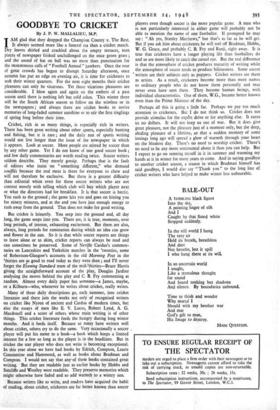GOODBYE TO CRICKET
By J. P. W. MALLALIEU, M.P.
Cricket, rich in so many things, is especially rich in writers. There has been great writing about other sports, especially hunting and fishing, but it is rare ; and the daily run of sports writing would not live longer than the issue of the newspaper in which it appears. Look at soccer. More people are stirred by soccer than by any other game. Yet I do not know of one good soccer book ; and few daily commentaries are worth reading twice. Soccer writers seldom describe. They merely gossip. Perhaps that is the fault Of editors who insist on "something different," who demand souffles because the real meat is there for everyone to chew and will not therefore be exclusive. But there is a greater difficulty' than editorial whim even for those soccer writers who are not content merely with telling which club will buy which player next or what the directors had for breakfast. It is that soccer is hectic. You rush to the ground ; the game hits you and goes on hitting you for ninety minutes, and at the end you have just enough energy to rush away from the ground. That does not make for good writing.
But cricket is leisurely. You seep into the ground and, all day long, the game seeps into you. There are, it is true, moments, over long periods, of intense, exhausting excitement. But there, are also, always, long periods for rumination during which an idea can grow and flower in the sun. So it is that while soccer reports are things to leave alone or to skim, cricket reports can always be read and can sometimes be preserved. Some of Neville Cardus's commen- taries on Lancashire and Yorkshire matches in the 'twenties, some of Robertson-Glasgow's accounts in the old Morning Post in the 'thirties are as good to read today as they were then ; and I'll never forget the Evening Standard team of the mid-'thirties—Bruce Harris giving the straightforward account of the play, Douglas Jardine analysing the moves behind the play and C. B. Fry commenting at random. Almost every daily paper has someone—a James, maybe, or a Kilburn—who, whenever he writes about cricket, really writes.
Many of these daily descriptions go, each summer, into cricket literature and there join the works not only of recognised writers on cricket like Nyren of ancient and Cardus of modern times, but also the essays of men like E. V. Lucas, Robert Lynd, A. G. Macdonell and a score of others whose main writing is of other things. This cricket literature feeds the hungry during long winter months. And it feeds itself. Because so many have written well about cricket, others try to do the same. Very occasionally a soccer player will put his name to a book—a book which keeps a limited interest for a few so long as the player is in the headlines. But in cricket the star player who does not write is becoming exceptional. In this year alone we have had books by Edrich, Compton, Learie Constantine and Hammond, as well as books about Bradman and Compton. I would not say that any ofthese books contained great writing. But they are readable just as 'earlierbooks by Hobbs and Sutcliffe and Woolley were readable. They preserve memories which might otherwise have faded and so add warmth to a wintry sun.
Because writers like to write, and readers have acquired the habit of reading, about cricket, cricketers are far better known than soccer players even though soccer is the more popular game. A man who is not particularly interested in either game will probably not be able to mention the name of one footballer. If prompted he may say : " Ah yes, Stanley Matthews," but that's as far as he will get. But if you ask him about cricketers he will reel off Bradman, Hobbs, W. G. Grace, and probably C. B. Fry and Ranji, right away. It is true that cricketers have a longer playing life than footballers do and so are more likely to catch the casual eye. But the real difference is that the atmosphere of cricket produces maturity of writing while the atmosphere of soccer tends -to produce "biliousness. Some soccer writers see their subjects only as puppets. Cricket writers see them as artists. As a result, cricketers become more than mere names to ordinary people who do not know them personally and may never even have seen them. They become human beings, with individual characteristics. One of them, W.G., became better known even than the Prime Minister of the day.
Perhaps all this is going a little far. Perhaps we pay too much attention to cricketers. But I do not think so. Cricket does not provide stimulus for the expert drive or for anything else. It earns us no dollars. It will not keep us out of war. But it does give great pleasure, not the pleasure just of a moment only, but the deep, abiding pleasure of a lifetime, so that a sudden memory of some innings long ago will spread a glow of warmth through your heart on the bleakest day. There's no need to worship cricket. There's no need to be any more sentimental about it than you can help. But I expect to go on sunning myself in it in summer and warming my hands at it in winter for many years to come. And in saying goodbye to another cricket season, a season in which Bradman himself has said goodbye, I would also say "Thank you" to the long line of cricket writers who have helped to make winter less unbearable.


































 Previous page
Previous page